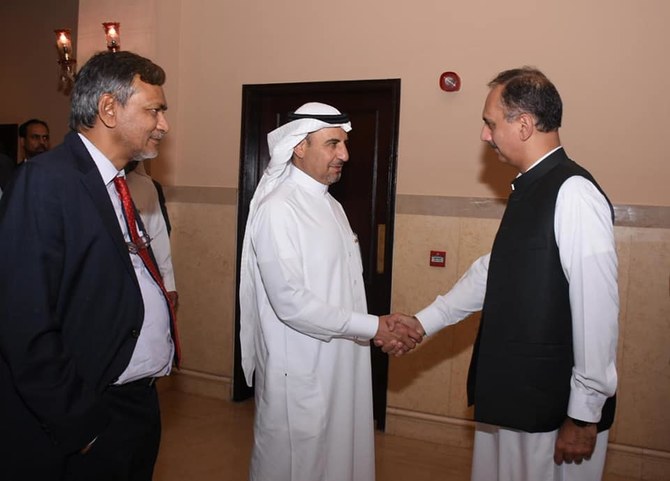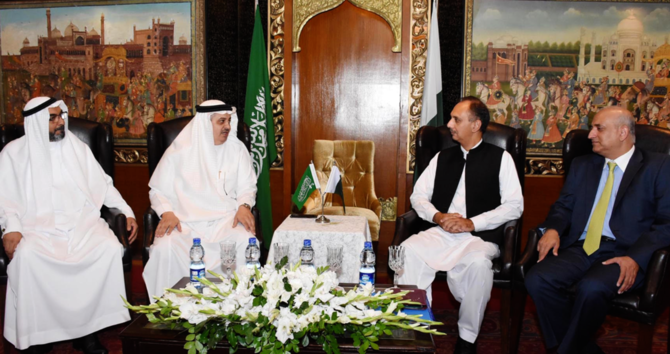ISLAMABAD: Work has started on $14.5 billion worth of Saudi energy and petroleum projects in Pakistan, Omar Ayub Khan, federal minister for power and petroleum, told Arab News on Monday.
The initiatives are part of an effort to boost the production and use of oil and renewable power and overcome power shortages in the South Asian nation.
“In the power sector, Saudis are helping us install 500 megawatts renewable energy projects worth $4.5 billion in Baluchistan and a $10 billion mega oil refinery in Gwadar, which are part of the $20 billion investment announced during Saudi Crown Prince Muhammad bin Salman’s visit to Pakistan earlier this year,” the minister said.
Only about 5 to 6 percent of the power to Pakistan’s national electrical grid currently comes from renewable energy, according to the country’s Alternate Energy Development Board (AEDB).
“Studies have been carried out by Saudi company Aqua Power, Pakistani National Transmission & Despatch Company (NTDC) and other leading companies to look into hybrid or solar projects. This will be a total $4.5 billion investment,” he added.
During a visit to Pakistan in February this year by Saudi Crown Prince Mohammed bin Salman, the two countries signed short-, mid- and long-term investment agreements worth over $20 billion, including for energy and petroleum projects.
Short-term projects signed in February include two Regasified Liquefied Natural Gas plants for $4 billion, a $2 billion investment by Saudi power producing company ACWA Power in Pakistan’s renewable energy sector and a $1 billion Saudi Fund for Pakistan.
Mid-term projects include $1 billion each for petrochemical and food and agricultural projects. The long-term investments are $10 billion for the construction of the multi-billion-dollar Saudi Aramco oil refinery in Gwadar and $2 billion for the minerals sector.
The total investment comes to $21 billion, according to government figures released after the crown prince’s visit.
Last year, Saudi Arabia also agreed to give Pakistan $3 billion in foreign currency support for a year and a further loan worth up to $3 billion in deferred payments for oil imports to help stave off a current account crisis.
Khan said the power projects in the pipeline also included a solar plant of 200-megawatt at the Habibullah coastal power station in Baluchistan and a 100-megawatt plant each in three other districts of the province.
He said the process of hiring technical experts for the Gwadar oil refinery project had started and would be completed in the next three months: “The refinery would have a 250,000 to 300,000 barrels per day capacity that would help Pakistan cut its annual crude oil import bill by nearly $3 billion,” the minister said.
He said this was the first phase of Saudi investment in Pakistan “and as soon as they will start achieving targets, another phase of investment would start.”
The minister said that Saudi investment would help Pakistan achieve its target of shifting 30 percent of its energy needs to the renewable energy sector by 2030.
“Alternative Energy Development Board cleared the draft renewable energy policy last week, in which we are taking renewable energy from the current 1,500 megawatts to approximately ,8000 megawatts by the end of 2025, and then to 20,000 megawatts by 2030,” Khan said.
Saudi Arabia and Pakistan, in collaboration with Baluchistan’s provincial government, were also working to explore minerals in the province in a bid to promote indigenous exploration and production activities in both the oil and gas sectors, Khan said.
“We would be auctioning approximately 40 blocks in the exploration and production sphere in Pakistan. In this process, we welcome Saudi companies to participate in upstream exploration activities,” Khan said. “Aramco is already working in the downstream exploration activities in Pakistan and we would welcome more Saudi companies to come in Pakistan for investment, whether it is upstream, middle stream or downstream.”
He also welcomed Saudi participation in the China Pakistan Economic Corridor of energy and infrastructure projects, the flagship of Beijing’s ambitious Belt and Road Initiative.
“It is a good opportunity for Saudis as well as other Middle Eastern companies to invest in Pakistan as it is next door to a big market like China,” the petroleum minister said.


















